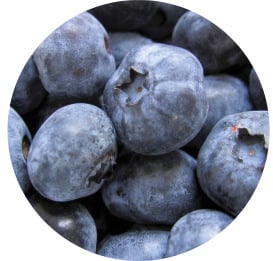IBD diet tips: Nourishing and delicious smoothies
by Judy Palken, MNS, RD, LDN
If you are not feeling well, having a flare, or want a nutritional boost give smoothies a try! Smoothies are a delicious, refreshing way to get in lots of great, nourishing foods. Blending breaks down foods, making it is easier for your gut to absorb the healthful components. If you have digestive issues such as diarrhea, malabsorption, or difficulty eating whole fruits and vegetables, this is important!
This smoothie is sweet, tangy and ever-so-slightly spiced—your family and friends without IBD will want it too! Have one for breakfast, a snack, or a dessert; spoon or straw!
Blueberry-Ginger Smoothie
Ingredits:
- ½ cup plain low fat or nonfat yogurt
- 1 cup frozen blueberries
- ⅓ cup unsweetened almond milk
- 1 tbsp honey
- ¼ tsp pure vanilla extract
- 1 tbsp grated ginger
- a dash cinnamon
Directions:
- Put all ingredients in a blender and purée until smooth.
- Add more almond milk if it’s too thick.
**If you use fresh blueberries, you can add ½ cup ice into the mix to keep the texture. If you are suffering a flare and having trouble with seeds, substitute a different frozen fruit–mango, peaches, or cherries work just as well.
Let’s take a look to see why this smoothie is good for you, especially if you have Inflammatory Bowel Disease (IDB).
Yogurt is an excellent source of beneficial bacteria (probiotics). In IBD, there seems to be an imbalance of good and bad bacteria in the gastrointestinal tract – eating probiotic-rich foods can help to restore the proper balance. Chose a yogurt with live, active cultures. And, always check the “best by” date. Also, it is wise to choose plain, low fat or nonfat yogurt.
Commercially-fruited, flavored yogurts have a lot of added sugar, and are best avoided. All that sugar is inflammatory, and feeds the bad bacteria!
Regular or Greek? Greek yogurt is strained, and has more protein, which is good if your food intake has been low. Either is type is good.
Blueberries contain a type of fiber that the good bacteria love to eat – this makes blueberries a good prebiotic food. Blueberries (and other berries) are a fantastic source ofanthocyanins, plant compounds that seem to protect against cardiovascular disease and certain cancers, and may help prevent the decline in mental functioning as we age. Be sure your frozen blueberries are unsweetened.
Almond milk – buy an unsweetened variety – it may be plain, or vanilla.You can also try soy milk, oat milk, hemp milk, and flax milk in smoothies. have fun trying different plant-based beverages. Soy milk stands out for its good protein and vitamin D content.
Honey is the sweetener of choice, ideally raw, local honey, which will have beneficial bacteria, making it another probiotic food.
Ginger has long been known to help alleviate gastrointestinal distress, and also contains anti-inflammatory compounds called gingerols. Fresh ginger root can be stored in the freezer to keep longer. Just slip it in a zip-loc bag.
Cinnamon, in addition to tasting great, contains proanthocyanidins, plant compounds which may help control blood sugar, and may decrease LDL-cholesterol and triglycerides (fats in the bloodstream).In fact, most herbs and spices are great sources of healthful plant compounds, so use them freely and often in your cooking.
You can learn more about the IBD-AID visiting the UMass Chan Medical School Center for Applied Nutrition
http://www.umassmed.edu/nutrition/ibd/ibd-aid/
Recipe adapted from: http://www.purewow.com/recipes/Blueberry-Ginger-Smoothie

